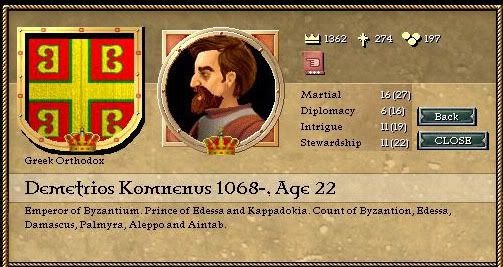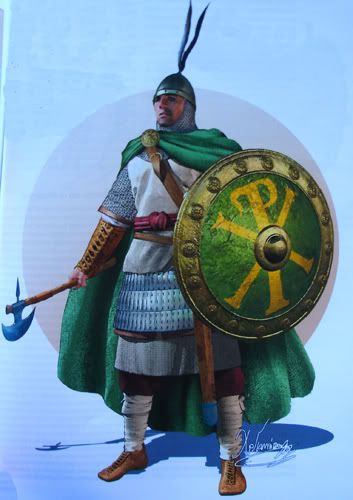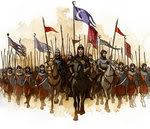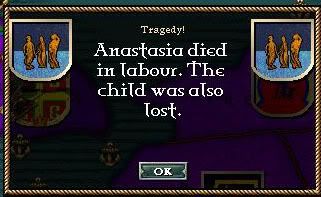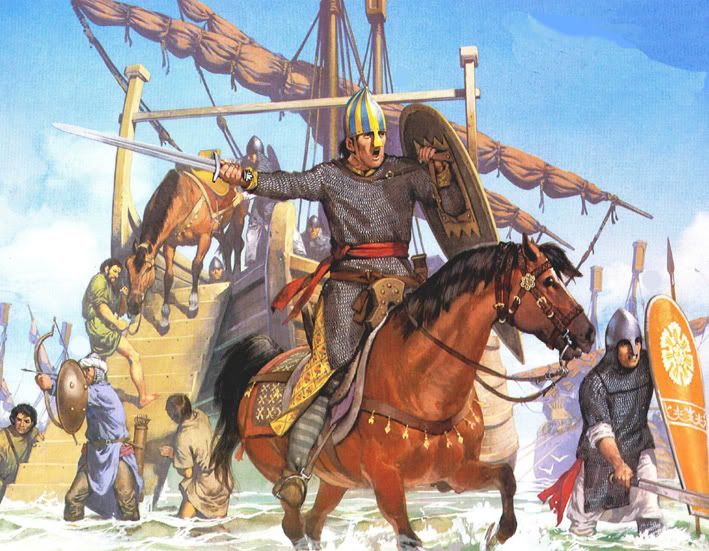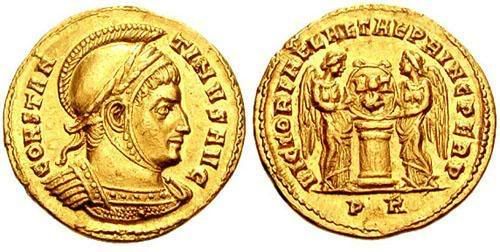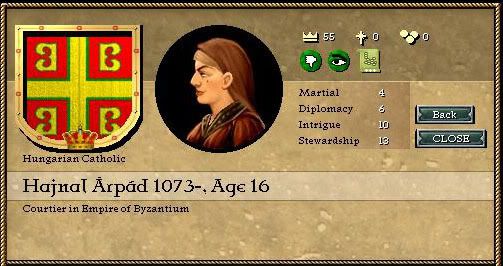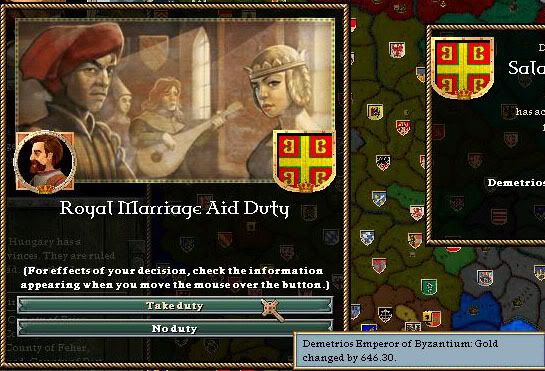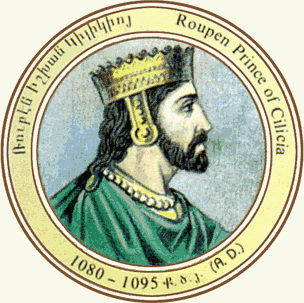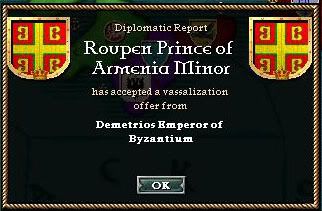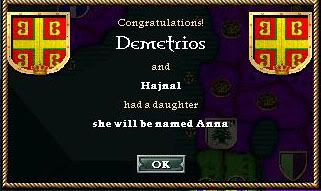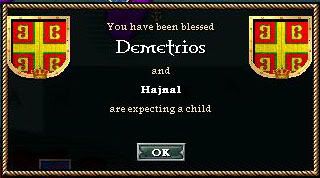Yeah, it was a close call. In game, it was more sitting there, waiting for the siege at Byzantion to run its course, while watching the huge Imperial fleet get closer and closer... it was quite nerve wracking! 
Part Two of the Update this Week...
================================================


The sun setting in the Sea of Marmara. Hagia Sophia is visible in the background.Evening cast a pale, mournful glow over the Kappadokian army. Food was becoming scarce, and the morale of the men was ebbing low.
Demetrios had been inside his private tent, at the side of Anastasia when the tumult first started. Princess Komnenos had seemed paler that morning than usual, and she had scarcely stirred all day. Even though she was near to term, the last three pregnancies had seen Anastasia up and about until the day before she delivered almost. The fact she wanted to lay down was enough to worry Demetrios.
He needed her.
He needed her political acumen, her brains, and most of all, for her to give him a son. He’d warned her to stay behind in Palmyra, but she had pointed out (rightfully so) that a dagger can kill just as easily in Palmyra as a sword can kill in the field, and whoever had struck down Demetrios’ old Logothetes was still about. He’d conducted the morning briefing of he officers by her bedside, and was loath to leave so long as the rest of the siege was running properly.
It was the shouts and cries of the soldiers that finally brought him to his feet.
“What’s all that? Anastasia asked weakly, as Demetrios in two steps covered the distance between her cot and the entrance to the tent.
When he snapped the tent flap open, he could see a small band of riders, only ten in number, far too small to be a raiding party, galloping towards the massed camp of the Kappadokian armies. High above the head of the lead rider snapped the broad black pennant of the Principality of Sinope. It took Demetrios only a minute to realize the second rider in the small column was none other than his uncle, Manuel…
“What is this?” Demetrios asked finally as the riders cantered into camp, soldiers looking up at their resplendent forms in awe. Manuel outshone the city fathers of Konstantinopolis, wearing silks and jewels that likely cost more than a small fortune. As soon as he spotted Demetrios’ shocked face, he reined his horse around and cantered to the front of the tent.
“Well met, Demetrios!” Manuel smiled, and Demetrios swore there were spiders in his uncle’s baritone voice.
“What is this?” Demetrios repeated himself.
“This?” Manuel gestured to the enormous golden medallion that covered his chest. It looked to weigh several pounds at least, and had an enormous emerald and ruby at its center. Demetrios thought he recognized the medallion from somewhere, but he couldn’t place it.
“No, this!” Demetrios waved an arm at his uncle and the band of riders. “What are you doing here? Last I heard you were in Sinope, no doubt planning the downfall of some unlucky lord.”
“Ha!” Manuel’s laugh was sharp and mocking. “You are a sharp one, young man. As a matter of fact, yes, I was plotting the downfall of many people. I am a Prince of Romanion, you see – it is our past-time, young Demetrios!” He grinned broadly as he dismounted. Demetrios thought it looked like a lion baring his fangs.
“What is the meaning of this?” Demetrios finally cried in confusion.
“Its simple, dear nephew,” Manuel the Spider smiled, putting a silk covered bejeweled arm around his bewildered nephew. “Dear old Basilieus Michael finally had a moment of brilliance, and decided the best way to stop an enemy was to make him his friend. So, he gave me this,” Manuel jingled the heavy gold chain on his chest. “I’m now the Megas Doux, and commander of the Imperial Fleet on the Sea of Marmara.” He stopped and grinned. “Pure bribery, you see.”
“For a man who wished to be Kaisar, your price was awfully low,” Demetrios scowled. To his anger, Manuel merely laughed.
“Oh, my dear nephew, how naïve you are. Think on it for a moment. If I wanted Michael gone, why would I accept the position of Megas Doux from him and cut your army off from communication and supplies?” He gestured inside Demetrios’ tent.
“Because you’re an opportunistic bastard?” Demetrios growled, holding the tent flap open for his uncle, and now his bane.
“No!” Manuel almost giggled, looking upwards for a second. “Maybe… yes. You see, dear nephew, this puts me in a position of total power… if you give me what I want, I let your troops have the supplies they need to maintain the siege, and even arrange for the doors of the city to open for you. If Michael gives me what I want, I cut you off and his throne is safe from one Komnenid lion. I am a hero to him, and free to safely plot another strike on him when the time is right.” He winked. “And as you know, with someone like Michael on the throne, that right time will arrive sooner, rather than later…”
You… Demetrios’ eyes narrowed, yet even as he mentally cursed his uncle’s name, he had to admit the genius of Manuel’s move. Michael’s dangerous gambit to bribe him had left Manuel seemingly in a position to gain, no matter what happened.
“I can either cut your army off and bar you from the city, or I can give you control of the better part of the Imperial fleet, and let you parade into Konstantinopolis as an Emperor should… its your choice.”
“How did you do it?” Anastasia stirred. In his confusion, Demetrios hadn’t realized she could hear them.
“Ah, young Anastasia, we meet at last!” Manuel bowed elegantly. “I have heard so much about your abilities, that I scarcely believed you were mortal!”
“How did you do it?” Demetrios repeated this time, crossing his arms. Michael knows you for an enemy! How the devil did you get him, let alone his brother, to put you in this position!?
Manuel gave a slight, secret smile, while tugging at a ring on his finger. “Oh, lets just say the Emperor owes me a debt for some past favors I have done for him…”
“Favors? For Michael?” Anastasia looked like she was in pain as well as doubtful.
“I told him it was a favor. In truth, I was acting of my own accord – by convenience I bested an enemy of the Emperor while helping myself,” Manuel admitted with a grin. “A happy circumstance, I have used to its fullest benefit.”
“Who?” Demetrios asked, only to have Manuel start to tsk quietly.
“Ah ah ah… you will have to discover that on your own. A master never trades his secrets to a journeyman.”
Demetrios felt his blood start to boil, until he realized exactly what a pinch he was stuck in. Manuel has the power to either give me the throne or deny it… dammit!
“What do you want?” Demetrios said wearily after a moment, slumping down into his camp chair. He has me by the balls…
“Several things. First, the title of Kaisar,” Manuel sat opposite, the smile gone from his lips. His eyes were now intent on Demetrios – he was serious.
“Kaisar? Why? You’re almost forty-five uncle, I’m to be twenty in two months. You won’t ever see the crown… would you…” Demetrios’ voice trailed off, and Manuel gave a sickening smile.
“No, of course not,” the elder Komnenos said, “But I do gain a great measure of authority. And you can trust while you are away on campaign the Empire will be competently run. Second, I want to retain the position of Megas Doux,, if only to keep you to holding your end of the bargain. Finally, as you have no male heirs, until such time comes I want the line of succession to pass through me.”
“What do you think will come of that?” Demetrios asked guardedly, his voice taking on a dangerous tone.
“Ease, my nephew,” Manuel held his hands up in a placating gesture, his smooth voice calming the air. “I too do not wish to see a Dukid on the throne again – and leaving the throne to me makes it securely in the hands of the Komnenids, should you not sire and heir…”
“We shall see. What else?”
“Oh, I think that is enough to demand in one day, don’t you think?” Manuel smiled darkly. “I wouldn’t want to strain our nascent partnership before it has a chance to fully form.”
“You speak with a great deal of confidence,” Demetrios hunched his shoulders angrily.
“I know you, dear nephew,” Manuel said directly. “I saw you as a child, and seeing you again, even for only a few hours several years ago, was enough for me to know you. And, if that weren’t enough, I know your wife is as cunning as she is beautiful,” he looked towards Anastasia and nodded his head.
“All the more reason to fear me,” Demetrios grumbled. “If I accept, you’ve backed me into a corner and made me do it. How do you account for sore memories of such a thing?”
“ I know you will look at it this way,” Manuel started to stand up, the long flowing robes of his office billowing as he started to walk towards the tent flap. “You gave me the position of Kaisar, and I gave you the Imperial throne. That trade is definitely in your favor.” He paused, before turning around with a grin. “Consider it my favor to you as a blood relative.”
“I’ll consider it as I consider it,” Demetrios retorted.
“Very well. When you have decided, send a rider to the city walls.” Manuel was already leaving. “It looks as if you have perhaps a week to decide!” he shouted over his shoulder as he remounted. Shortly thereafter, the noise of cantering hooves disappeared, leaving Demetrios and his wife alone to consider the proposition.
“The serpent raises his head?” Anastasia raised herself up and smiled weakly.
“Yes, and his whole ugly body too,” Demetrios sighed. He looked at his pale, increasingly frail looking wife. Now, more than ever, he needed guidance. “Do I take his offer?”
Anastasia gave a weak laugh, and started to roll her eyes.
“Do you have much of a choice?”
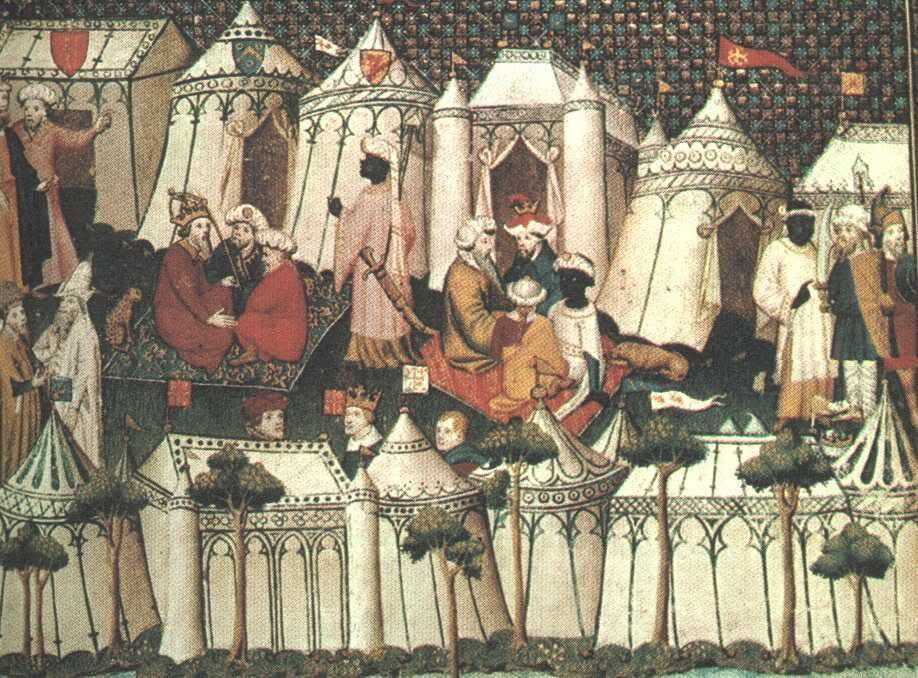
A fanciful interpretation from the Kingdom of England of the Kappadokian camps outside the walls of Konstantinopolis. Note how the illustrator has depicted Demetrios fully bearded and crowned. – from John Wainwright’s Brief Guide to Roman History= = = = = = = = = = = = = = = = = = = = = = = = = = = = = = = = = = = = = = = =
The next day, the great Imperial fleet in the Bosphorous suddenly peeled north, the oars of its great dromons beating a steady, fast clip upon the restless sea. Within hours, the backed up trade ships from Anatolia began landing south of the city, and soon Demetrios’ army was feasting on long awaited breads, wines, cheeses and meat. Few noticed the constant stream of messengers riding into the camp and from the city, or the constant barrage of messages the other way…
Around five P.M. that evening, a soldier from the Kappadokian armies noticed that the Imperial standard was no longer flying above the Theodosian Walls, and as the sun set, all eyes in the Kappadokian Army watched as a new banner fluttered above the city – the blue and sky blue of Kappadokia, flapping in the wind. A few minutes later, the titanic bronze doors of the Military Gate swung open, and a long line of dignitaries rode forth, headed by Manuel Komnenos, Megas Doux and head of the Imperial Fleet. After Demetrios rode out to meet them, a few words, inaudible to the army, were exchanged, before Demetrios turned, and galloped to the front of his men.
“Soldiers!” he called, a smile on his lips. “You have marched and fought well! For eight months, we have campaigned against this false Emperor! And now, let this day, the 5th of February, the Year of Our Lord One Thousand Ninety, be remembered in the annals of history, for we are about to march into the Queen of Cities!”
An enormous cheer erupted from the massed troops, coupled with chants of Demetrios’ name. The Komnenos raised his hand, calling for silence.
“Soldiers! We march into Konstantinopolis not as conquerors, but as victors, not as plunderers, but as saviors! There will be no looting, not pillaging of this most holy of cities! As God is my witness, any man who loots or pillages will be struck down by the will of the Almighty!”
“Yet your efforts will not go unrewarded. I promise you, my loyal soldiers, some of whom marched with me even in Tripoli, that my first act as Basilieus will be to secure your true, just reward!”
More cheers erupted, and as chants of “Komnenos!” thundered in the air, Demetrios turned and looked at the Lord of Sinope. He nodded his head, and smiled in approval…
Part Two of the Update this Week...
================================================


The sun setting in the Sea of Marmara. Hagia Sophia is visible in the background.
Demetrios had been inside his private tent, at the side of Anastasia when the tumult first started. Princess Komnenos had seemed paler that morning than usual, and she had scarcely stirred all day. Even though she was near to term, the last three pregnancies had seen Anastasia up and about until the day before she delivered almost. The fact she wanted to lay down was enough to worry Demetrios.
He needed her.
He needed her political acumen, her brains, and most of all, for her to give him a son. He’d warned her to stay behind in Palmyra, but she had pointed out (rightfully so) that a dagger can kill just as easily in Palmyra as a sword can kill in the field, and whoever had struck down Demetrios’ old Logothetes was still about. He’d conducted the morning briefing of he officers by her bedside, and was loath to leave so long as the rest of the siege was running properly.
It was the shouts and cries of the soldiers that finally brought him to his feet.
“What’s all that? Anastasia asked weakly, as Demetrios in two steps covered the distance between her cot and the entrance to the tent.
When he snapped the tent flap open, he could see a small band of riders, only ten in number, far too small to be a raiding party, galloping towards the massed camp of the Kappadokian armies. High above the head of the lead rider snapped the broad black pennant of the Principality of Sinope. It took Demetrios only a minute to realize the second rider in the small column was none other than his uncle, Manuel…
“What is this?” Demetrios asked finally as the riders cantered into camp, soldiers looking up at their resplendent forms in awe. Manuel outshone the city fathers of Konstantinopolis, wearing silks and jewels that likely cost more than a small fortune. As soon as he spotted Demetrios’ shocked face, he reined his horse around and cantered to the front of the tent.
“Well met, Demetrios!” Manuel smiled, and Demetrios swore there were spiders in his uncle’s baritone voice.
“What is this?” Demetrios repeated himself.
“This?” Manuel gestured to the enormous golden medallion that covered his chest. It looked to weigh several pounds at least, and had an enormous emerald and ruby at its center. Demetrios thought he recognized the medallion from somewhere, but he couldn’t place it.
“No, this!” Demetrios waved an arm at his uncle and the band of riders. “What are you doing here? Last I heard you were in Sinope, no doubt planning the downfall of some unlucky lord.”
“Ha!” Manuel’s laugh was sharp and mocking. “You are a sharp one, young man. As a matter of fact, yes, I was plotting the downfall of many people. I am a Prince of Romanion, you see – it is our past-time, young Demetrios!” He grinned broadly as he dismounted. Demetrios thought it looked like a lion baring his fangs.
“What is the meaning of this?” Demetrios finally cried in confusion.
“Its simple, dear nephew,” Manuel the Spider smiled, putting a silk covered bejeweled arm around his bewildered nephew. “Dear old Basilieus Michael finally had a moment of brilliance, and decided the best way to stop an enemy was to make him his friend. So, he gave me this,” Manuel jingled the heavy gold chain on his chest. “I’m now the Megas Doux, and commander of the Imperial Fleet on the Sea of Marmara.” He stopped and grinned. “Pure bribery, you see.”
“For a man who wished to be Kaisar, your price was awfully low,” Demetrios scowled. To his anger, Manuel merely laughed.
“Oh, my dear nephew, how naïve you are. Think on it for a moment. If I wanted Michael gone, why would I accept the position of Megas Doux from him and cut your army off from communication and supplies?” He gestured inside Demetrios’ tent.
“Because you’re an opportunistic bastard?” Demetrios growled, holding the tent flap open for his uncle, and now his bane.
“No!” Manuel almost giggled, looking upwards for a second. “Maybe… yes. You see, dear nephew, this puts me in a position of total power… if you give me what I want, I let your troops have the supplies they need to maintain the siege, and even arrange for the doors of the city to open for you. If Michael gives me what I want, I cut you off and his throne is safe from one Komnenid lion. I am a hero to him, and free to safely plot another strike on him when the time is right.” He winked. “And as you know, with someone like Michael on the throne, that right time will arrive sooner, rather than later…”
You… Demetrios’ eyes narrowed, yet even as he mentally cursed his uncle’s name, he had to admit the genius of Manuel’s move. Michael’s dangerous gambit to bribe him had left Manuel seemingly in a position to gain, no matter what happened.
“I can either cut your army off and bar you from the city, or I can give you control of the better part of the Imperial fleet, and let you parade into Konstantinopolis as an Emperor should… its your choice.”
“How did you do it?” Anastasia stirred. In his confusion, Demetrios hadn’t realized she could hear them.
“Ah, young Anastasia, we meet at last!” Manuel bowed elegantly. “I have heard so much about your abilities, that I scarcely believed you were mortal!”
“How did you do it?” Demetrios repeated this time, crossing his arms. Michael knows you for an enemy! How the devil did you get him, let alone his brother, to put you in this position!?
Manuel gave a slight, secret smile, while tugging at a ring on his finger. “Oh, lets just say the Emperor owes me a debt for some past favors I have done for him…”
“Favors? For Michael?” Anastasia looked like she was in pain as well as doubtful.
“I told him it was a favor. In truth, I was acting of my own accord – by convenience I bested an enemy of the Emperor while helping myself,” Manuel admitted with a grin. “A happy circumstance, I have used to its fullest benefit.”
“Who?” Demetrios asked, only to have Manuel start to tsk quietly.
“Ah ah ah… you will have to discover that on your own. A master never trades his secrets to a journeyman.”
Demetrios felt his blood start to boil, until he realized exactly what a pinch he was stuck in. Manuel has the power to either give me the throne or deny it… dammit!
“What do you want?” Demetrios said wearily after a moment, slumping down into his camp chair. He has me by the balls…
“Several things. First, the title of Kaisar,” Manuel sat opposite, the smile gone from his lips. His eyes were now intent on Demetrios – he was serious.
“Kaisar? Why? You’re almost forty-five uncle, I’m to be twenty in two months. You won’t ever see the crown… would you…” Demetrios’ voice trailed off, and Manuel gave a sickening smile.
“No, of course not,” the elder Komnenos said, “But I do gain a great measure of authority. And you can trust while you are away on campaign the Empire will be competently run. Second, I want to retain the position of Megas Doux,, if only to keep you to holding your end of the bargain. Finally, as you have no male heirs, until such time comes I want the line of succession to pass through me.”
“What do you think will come of that?” Demetrios asked guardedly, his voice taking on a dangerous tone.
“Ease, my nephew,” Manuel held his hands up in a placating gesture, his smooth voice calming the air. “I too do not wish to see a Dukid on the throne again – and leaving the throne to me makes it securely in the hands of the Komnenids, should you not sire and heir…”
“We shall see. What else?”
“Oh, I think that is enough to demand in one day, don’t you think?” Manuel smiled darkly. “I wouldn’t want to strain our nascent partnership before it has a chance to fully form.”
“You speak with a great deal of confidence,” Demetrios hunched his shoulders angrily.
“I know you, dear nephew,” Manuel said directly. “I saw you as a child, and seeing you again, even for only a few hours several years ago, was enough for me to know you. And, if that weren’t enough, I know your wife is as cunning as she is beautiful,” he looked towards Anastasia and nodded his head.
“All the more reason to fear me,” Demetrios grumbled. “If I accept, you’ve backed me into a corner and made me do it. How do you account for sore memories of such a thing?”
“ I know you will look at it this way,” Manuel started to stand up, the long flowing robes of his office billowing as he started to walk towards the tent flap. “You gave me the position of Kaisar, and I gave you the Imperial throne. That trade is definitely in your favor.” He paused, before turning around with a grin. “Consider it my favor to you as a blood relative.”
“I’ll consider it as I consider it,” Demetrios retorted.
“Very well. When you have decided, send a rider to the city walls.” Manuel was already leaving. “It looks as if you have perhaps a week to decide!” he shouted over his shoulder as he remounted. Shortly thereafter, the noise of cantering hooves disappeared, leaving Demetrios and his wife alone to consider the proposition.
“The serpent raises his head?” Anastasia raised herself up and smiled weakly.
“Yes, and his whole ugly body too,” Demetrios sighed. He looked at his pale, increasingly frail looking wife. Now, more than ever, he needed guidance. “Do I take his offer?”
Anastasia gave a weak laugh, and started to roll her eyes.
“Do you have much of a choice?”

A fanciful interpretation from the Kingdom of England of the Kappadokian camps outside the walls of Konstantinopolis. Note how the illustrator has depicted Demetrios fully bearded and crowned. – from John Wainwright’s Brief Guide to Roman History
The next day, the great Imperial fleet in the Bosphorous suddenly peeled north, the oars of its great dromons beating a steady, fast clip upon the restless sea. Within hours, the backed up trade ships from Anatolia began landing south of the city, and soon Demetrios’ army was feasting on long awaited breads, wines, cheeses and meat. Few noticed the constant stream of messengers riding into the camp and from the city, or the constant barrage of messages the other way…
Around five P.M. that evening, a soldier from the Kappadokian armies noticed that the Imperial standard was no longer flying above the Theodosian Walls, and as the sun set, all eyes in the Kappadokian Army watched as a new banner fluttered above the city – the blue and sky blue of Kappadokia, flapping in the wind. A few minutes later, the titanic bronze doors of the Military Gate swung open, and a long line of dignitaries rode forth, headed by Manuel Komnenos, Megas Doux and head of the Imperial Fleet. After Demetrios rode out to meet them, a few words, inaudible to the army, were exchanged, before Demetrios turned, and galloped to the front of his men.
“Soldiers!” he called, a smile on his lips. “You have marched and fought well! For eight months, we have campaigned against this false Emperor! And now, let this day, the 5th of February, the Year of Our Lord One Thousand Ninety, be remembered in the annals of history, for we are about to march into the Queen of Cities!”
An enormous cheer erupted from the massed troops, coupled with chants of Demetrios’ name. The Komnenos raised his hand, calling for silence.
“Soldiers! We march into Konstantinopolis not as conquerors, but as victors, not as plunderers, but as saviors! There will be no looting, not pillaging of this most holy of cities! As God is my witness, any man who loots or pillages will be struck down by the will of the Almighty!”
“Yet your efforts will not go unrewarded. I promise you, my loyal soldiers, some of whom marched with me even in Tripoli, that my first act as Basilieus will be to secure your true, just reward!”
More cheers erupted, and as chants of “Komnenos!” thundered in the air, Demetrios turned and looked at the Lord of Sinope. He nodded his head, and smiled in approval…
Last edited:
- 2




